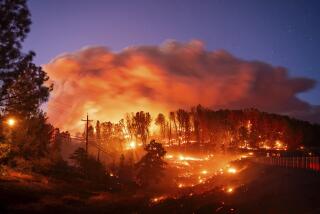Neighbors Decry Anaheim Cross Burning
Police and the FBI are investigating as a hate crime the burning of an 8-foot cross in the frontyard of an Anaheim Hills family, a crime that shocked neighbors on the victimsâ quiet cul-de-sac.
Greg Harris, 53, awoke shortly before 4 a.m. Tuesday to a cheer outside his home in the 5800 block of Paseo Balboa. Looking out his front window, he saw a wooden cross in flames. The cross was draped with burning rags and pantyhose.
Harris, who is black, screamed to wake his wife, Evelyn, 53, who is Latino. Then he hosed down the burning cross. The culprits, he said, fled in a car but left behind a plastic bucket that smelled of gasoline.
âI was angry,â said Harris, a former Marine and self-employed computer installer whose family has lived in the house for 12 years. âI wish I was there earlier to catch them. I know they didnât just pick any yard. They picked my yard and had the nerve to dig a deep hole in it.â
Though authorities have no suspects, the incident echoes a dark chapter in Anaheimâs history. In the 1920s, the Ku Klux Klan controlled local politics and police, and patrolled city streets in robes and masks interrogating residents.
The city is very different today. A day after the burning, the diverse hillside neighborhood of eight homes with longtime residents from Poland, Cuba and China is shaken up.
Mike Hutchens, 62, who has lived on the cul-de-sac for 30 years, said the cross-burning angers him.
âIâve only seen it in movies,â he said. âItâs probably some young people who donât know anything about history.â
Authorities are investigating the incident as a hate crime.
âPeople donât burn crosses on lawns as a prank,â said Police Sgt. Rick Martinez. âThereâs an obvious message that was being sent out.â
Though the FBI reports that nearly one-third of the 11,430 hate crimes reported nationwide in 2001 were directed at blacks, cross burnings are rare. The Southern Poverty Law Center counted about 30 in 2002, down from about one a week in the late 1990s.
In 2000, three men -- two 19-year-olds and a 21-year-old -- were given probation for setting a cross on fire in the driveway of an interracial Shadow Hills family in Los Angeles County. In 1999, an 18-year-old who burned a cross on the lawn of a Jewish familyâs house in Huntington Beach was sentenced to two years in prison.
Those cases highlight the typical offender in cross burnings, said Mark Potok, a spokesman for the Southern Poverty Law Center. âThe vast majority of cross burnings are not done by some Klansman,â he said. âTheyâre typically done by a racist teenager who despises a family whoâs moved into the neighborhood.â
Greg Harrisâ neighbors have reached out to him, and his telephone hasnât stopped ringing from friends who want to apologize.
âIâm feeling better from all the support, because it shows that this is not southern Alabama in 1950,â Harris said.
Harris was born in Washington, D.C., to parents who were civil-rights activists. His mother marched with the Rev. Martin Luther King Jr. and was one of six teachers who helped integrate the Baltimore school system.
He and his wife, Evelyn, a mail carrier who was born and raised in Santa Ana, were married 31 years ago and have two grown children. Neighbors describe Harris as a helpful man who often helps lift heavy items from neighborsâ cars and scrambles onto roofs to fix leaks.
Blacks make up only about 3% of Anaheimâs population, whites account for about one-third, and Latinos for nearly half.
In the 1920s, though, Anaheim was nearly all white. For a time, the KKK secretly sponsored a majority on the City Council and publicly intimidated immigrants, Mexicans and Catholics.
âI doubt that the rocket scientists who did this cross burning ... have any knowledge or sense of that era of Orange County history,â said Rusty Kennedy, executive director of the Orange County Human Relations Commission.
Anaheim Hills, with its neat lawns and $400,000 homes, is the 21st century face of the city. And until Tuesday morning, Greg Harrisâ neighborhood was one where people didnât hesitate to go for a stroll at midnight or leave garages and homes unlocked.
Not anymore. On Tuesday night, the residents of Paseo Balboa said they slept uneasily, locked their doors and peeked out their windows looking for strange cars cruising by.
âIâm afraid,â said Amy Fang, who moved in 11 years ago. âItâs dangerous. I was worried theyâd come back. I donât understand why they did that.â
More to Read
Sign up for Essential California
The most important California stories and recommendations in your inbox every morning.
You may occasionally receive promotional content from the Los Angeles Times.










